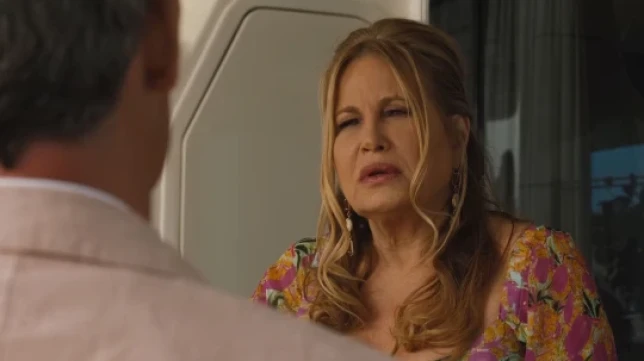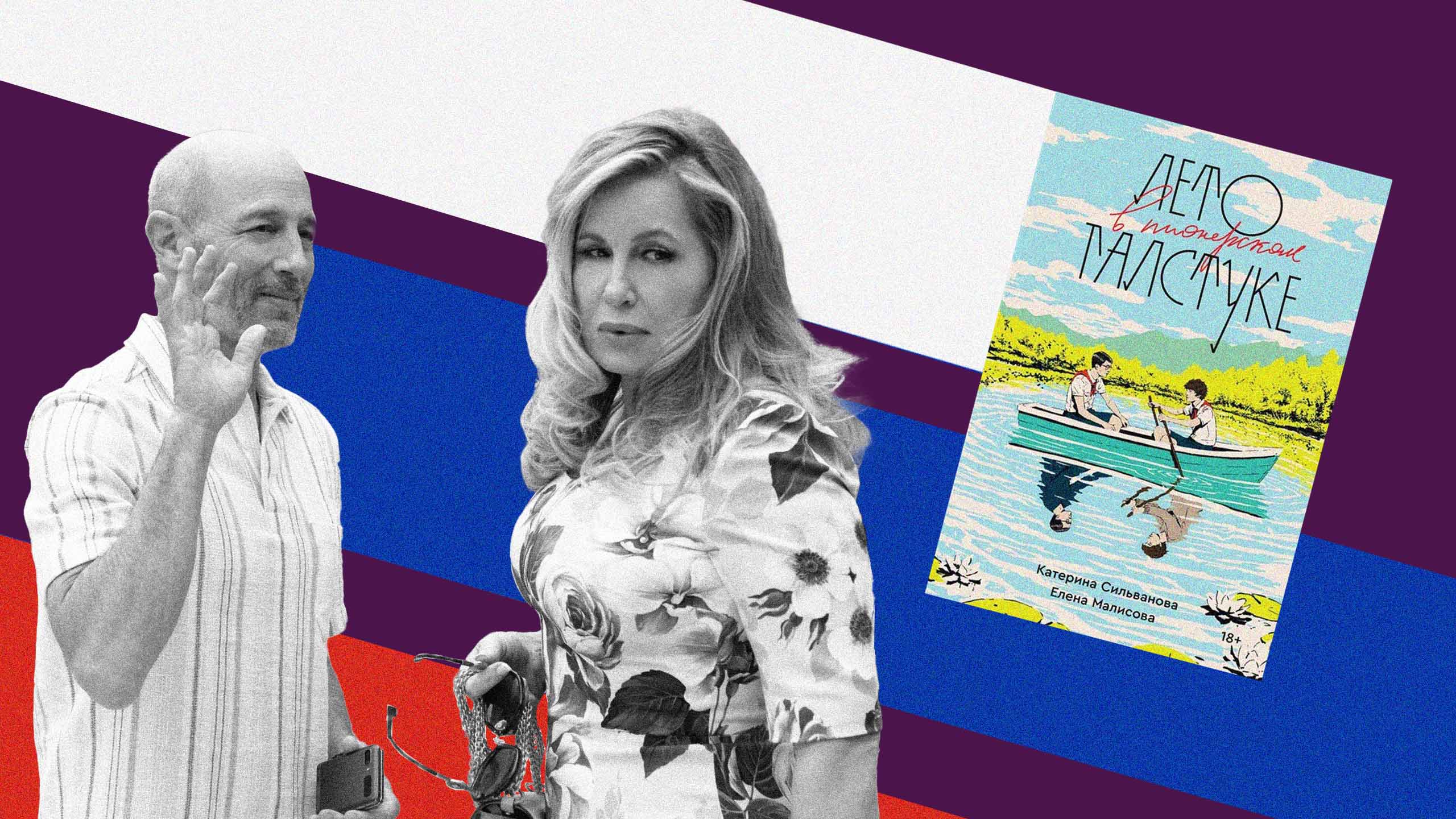Critics and viewers alike praised The White Lotus’s sophomore season, not just for its striking imagery of Sicilian shorelines and the array of remarkable talent involved. But also for its nuanced perception of sexual politics, from one character’s gay-for-pay secrets to another’s clumsy yet endearing sexual awakening.
Yet all of this was lost on Russian viewers who watched the hit series in the only officially available format via streaming platform Amediateka, which has been boasting the “Home of HBO” tagline since its inception in 2011. The platform, which also provides content to another local streaming giant, Kinopoisk HD, severely censored the second season of The White Lotus.
Scenes were removed, lines of dialogues were purposefully mistranslated in dubbing and Russian subtitles (“We’re all gays here,” for example, became “We’re all men here”) and—in, perhaps, the most confusing instance—bare buttocks of actor Leo Woodall (whose character was naked following a very heterosexual encounter, mind you) were covered with a poorly photoshopped blanket.
Another queer HBO smash, Euphoria, was also edited in similar ways by Amediateka. The Telegram channel Into the Streaming-Verse counted nearly two hours’ worth of content that was cut out of the series’ second season and concluded: “It looks like in a few years all that’s left from Euphoria will be just the HBO logo.”
Older shows aren’t immune to Russian censors either. Viewers also discovered that the translation of Sex and the City was tweaked, replacing the word “gay” with “boy,” while several scenes were completely cut out.

Credit: Courtesy of HBO
Following a request for comment, Amediateka told Xtra they do not comment on the subject matter, while the U.S. office for HBO did not respond to a request for comment on how Russia censors the network’s series.
In Russia, most experts consider Amediateka’s decision to be a choice of the network, rather than driven by government directive. This opinion was backed by Aleksandr Khinshtein, the chairman of the Committee of the State Duma of the Federal Assembly of the Russian Federation on Information Policy, Information Technologies and Communications. In his own Telegram channel he stated that “our laws do not ban mentioning LGBT, but its propaganda,” adding that the censorship (or “circumcision,” the word Khinshtein used) of Euphoria and other HBO shows was “an absolute initiative of Amediateka and Kinopoisk” and that “the law does not require changing ‘a gay’ into ‘a boy.’”
Since the newest “anti-propaganda” law is so vaguely worded, with clarifications expected to arrive later in the fall, film, book, TV and cultural distributors are taking it upon themselves to determine what needs to get mistranslated, tweaked or simply cut out in order to protect themselves from any potential repercussions.
“Fixing” the law
The amended ban in question was signed into law by President Vladimir Putin at the end of last year. It is a more severe version of 2013’s law that saw the country outlawing “LGBT propaganda” and “demonstrations of LGBTQ+ behaviour” among children under 18 (i.e., holding hands in public, men wearing colourful nail polish, kissing …).
After December 2022 all kinds of “LGBT propaganda” are considered illegal. The list includes “untraditional sexual relationships,” “gender reassignment” and “pedophilia,” while the minimum penalty is 50,000 rubles (approximately CAD $900) and the maximum is 5,000,000 rubles (approximately CAD $90,380).
Lawmakers are still working on the list of criteria for proclaiming a work of art “illegal,’ and it will come into effect in September. But insiders report that in the end of December 2022 Roskomnadzor (the Federal Service for Supervision of Communications, Information Technology and Mass Media in Russia) already issued its own list of movies and TV shows that were to be removed from all the legal streaming platforms including Call Me By Your Name, Brokeback Mountain, the first season of The Sex Lives of College Girls and several episodes of This Is Going to Hurt.
Some politicians, including Nina Ostanina, head of the Russian State Duma Committee for Family, Women’s and Children’s Affairs, have argued that a prison sentence should be considered for repeated offenders.
No love for Elton
This isn’t the first time Russian distributors have censored queer content. Russian film distribution and production company Central Partnership removed the only sex scene in the 2019 Elton John biopic Rocketman, as well as a still frame from the ending, that revealed that John was happily living with his husband.
Dima Barch, an openly gay filmmaker and former movie critic, says distributors made the censorship choice in order to appease Russian lawmakers.
“The distributors were simply afraid that their movie would not receive the distribution certificate if they present the unedited version of the film to the Ministry of Culture of the Russian Federation,” he says.
Both of Barch’s careers faced an abrupt end in Russia and pushed him to leave the country last year. He says his short film Dead End, about a young man who murders his abusive boyfriend, has found festival success abroad, but faced barriers in Russia to even get screened. “We tried getting it into only one Russian film festival, Horror Fest,” Barch recalls. “But when we submitted the synopsis, [the] festival’s team tried to replace the word ‘boyfriend’ with ‘companion,’ ‘friend,’ etc.”
He says making queer films in Russia is incredibly difficult, not just because of censorship, but because productions usually require government funding. “My movie isn’t necessarily a queer movie; it’s a horror movie with queer content. But you can’t get money to make and promote movies like this in Russia,” says Barch.
Camping out the bookstore
Many experts think that the newest anti-gay law in Russia is a direct reaction to the young adult novel Summer in a Pioneer Tie by Elena Malisova and Katerina Silvanova, which is about a pioneer boy who falls in love with his male camp counsellor in Soviet Russia in the mid-1980s.
Originally published online in 2016, the novel was published in print by indie publisher Popcorn Books in 2021 and spawned a sequel the next year. Soon after the new law was passed in late 2022, criminal proceedings were instituted in regard to Popcorn Books “propagandizing LGBTQ+.” Popcorn Books is expected to pay a yet-undisclosed fine, while it was also reported by a government’s representative that its current owner, Denis Kotov, will “dramatically change its editorial policies.”
On Feb. 3, both authors were added to the list of “foreign agents” by the Russian government. The term has been applied since 2012 to pretty much anybody who doesn’t support the government, in one way or another. So-called foreign agents are subject to additional audits and have to mention their status at any social media post they make.
The sequel to Summer in a Pioneer Tie, which boasted a total circulation of over 300,000 copies in the first half of 2022, was simply removed from all the bookstores. In their interview with Xtra, both writers say that the book’s unique journey took them by surprise: both the initial hype, and the intense bullying that followed. To them, the book was a perfect “whipping boy” for the government, who was looking for a reason to rewrite the law.
“It was the first thing they could find because it was already very noticeable and popular. Our book was also ‘tarnishing the image’ of the Soviet Union and its young pioneers since it was about gay people,” they said.
Originally, the book didn’t even break any laws. It was sold wrapped in plastic and had an “18+” label on the cover. But it’s still become a hot topic on state TV talk shows and pro-Putin Telegram channels, with some activists even buying copies of the book just to dramatically recycle the paper.
“The scariest thing is that right now Russia is living in fear. The fears differ. Someone’s afraid of getting sent to the war. Someone’s afraid of poverty. And the fear will only intensify once the economy will decline. At some point fear turns into violence. And we think that the law was created to instigate the violence toward something that’s convenient for the authorities. The power basically say: ‘You can harm queer people, we’re okay with that.’ In our opinion, the law was mostly amended in order to distract the people who support Putin and make them discuss something other than Russia’s setbacks at the front line.”
“The law was mostly amended in order to distract the people who support Putin and make them discuss something other than Russia’s setbacks at the front line.”
While Silvanova and Malisova’s writing was gay enough to be banned altogether, other writers and publishers have opted to preemptively censor themselves to avoid penalties. For example, Max Falk’s young-adult novel Shattered was reprinted with black lines crossing out all of the “illegal” content. According to Malisova, other publishing houses are advising writers who are already working on new queer novels to change the gender of their characters, so that the gay love story becomes a “traditional” one.
“We think that some writers will do that,” she says. “But we won’t. We’d rather publish our work for free online or even keep our writing private than ‘rape’ our characters in order to please this madness. For us, it would be worse than homophobia.”
Malisova and Silvanova consider themselves to be “blacklisted” in Russia, although they’ve got nothing but praise for their supportive publishing house. However, Popcorn Books decided to stop releasing LGBTQ+-themed books in November, even before the lawsuit from the government.
Dima Barch also thinks that any happy ending scenario for Russian queer entertainment will be left on the cutting floor: “We’re about to see more censorship of all kinds. The fear will only intensify, while queer people in the Russian media space will quickly disappear.”
It seems likely that any content even slightly touching upon LGBTQ+ issues will not be officially released in Russia. Of course, Russians will still find a way to consume foreign content via illegal platforms and social media (streaming never truly stamped out piracy in the country). But it’s impossible to imagine any locally produced LGBTQ+ content being distributed openly. Like many times throughout history, queer culture will go deeper underground.

 Why you can trust Xtra
Why you can trust Xtra


